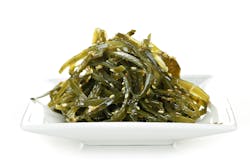Food manufacturers could make processed foods more healthy by adding seaweed, according to a new study published in the journal Phycologia.
Researchers in Denmark and Canada reviewed existing knowledge on the health effects of 35 different seaweed species. They concluded that adding edible seaweed to foods such as frozen pizzas, hot dogs and dried pasta would reduce cardiovascular diseases.
Many species of seaweed offer health benefits as they contain, among other things, beneficial proteins, antioxidants, minerals, trace elements, dietary fiber and polyunsaturated fatty acids.
Another benefit is that, unlike sodium salts typically used in processed food, seaweed’s content of potassium salts does not lead to high blood pressure.
And seaweed has umami — the fifth basic taste, which is known to promote satiety and hence regulate food intake in addition to reduce the craving for salt, sugar and fat.
The authors of the study say that dried and granulated seaweed could replace some of the flour when producing dry pasta, bread, pizza and snack bars. Manufacturers could also add seaweed to meat products, making them higher in dietary fiber and antioxidants and helping to lower cholesterol levels.
The researchers describe a study in which a group of overweight but otherwise healthy men were asked to taste bread with added dried seaweed. This study found that the taste of the bread was acceptable as long as the seaweed content was kept under 4 percent.
By eating bread containing 4 percent dried seaweed the overweight men ingested more dietary fiber (4.5 grams more fiber per 100 grams) than when they ate the control wholemeal bread. Another effect was that they consumed 16.4 percent less energy in the 24 hours after eating the seaweed-enriched bread, the University of Southern Denmark reported.
“We know that many people have difficulty distinguishing between healthy and unhealthy food,” the authors said. “By adding seaweed to processed foods we can make food healthier. In many cases we also get tastier food, and it may also help reduce the risk of cardiovascular diseases.”
